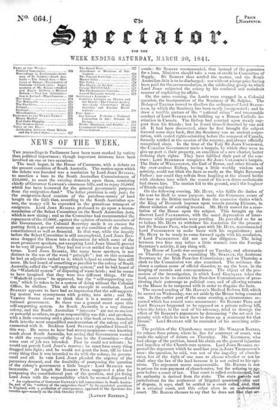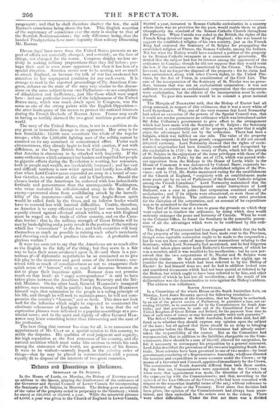NEWS OF THE WEEK.
THE proceedings in Parliament have been more marked by variety than political importance ; though important interests have been involved on one or two occasions.
The week began, in the House of Commons, with a debate on the present condition of South Australia. The motion upon which the debate was founded was a resolution by Lord JOHN RUSSELL, to sanction a loan to the South Australian Commissioners of 210,0001., to meet the existing demands upon them, consisting chiefly of Governor GAWLER'S enormous bills, and to repay 56,0001. which has been borrowed for the general government purposes from the emigration-fund.* The latter provision is only just; for the emigration-fund consists of the purchase-money of land bought on the faith that, according to the South Australian sys- tem, the money will be expended in the gratuitous transport of emigrants. Lord Joust RUSSELL professed to go upon a recom- mendation of the Select Committee on the South Australian Acts, which is now sitting ; and as the Committee had recommended the repayment of the 56,0001., against the opinion of certain members of the Government, the Colonial Secretary made it an excuse for putting forth a general statement on the condition of the colony, constitutional as well as financial. In that way, while the inquiry before the Select Committee is still uncompleted, Lord Jons Rus- SELL dragged the House into a discussion for which some of the most prominent speakers, not excepting Lord JOHN himself, proved to be very ill prepared. They had not even settled the use of their terms. Lord Jomv RUSSELL, like many loose speakers, is not distinct in the use of the word " principle" : but on this occasion he had an adjective tacked to it, which helped to confuse him still more. He had heard of something as peculiar to the colony of South Australia, called the "self-supporting system," and he had heard of the "Wakefield system" of disposing of waste lands ; and he seems to have imagined that they were two different things. Of the " Wakefield system" he approved, but the " self-supporting sys- tem," which he takes to be a system of doing without the Colonial Office, he dislikes. This set the example in confusion. Lord STANLEY appears to have had an impression that the self-support- ing system was synonymous with getting into debt ; and Mr. VERNON Surrll seems to think that it is a matter of consti- tutional government. So there was a general onset upon this self-supporting system. As South Australia is a very distant colony, and the South Australian " interests " are not so ancient or powerful as others, no great responsibility was felt ; and speakers, with a little cramming and a glance at a blue book or two, launched forth into the most unqualified condemnation of the colony and all connected with it. Reckless Lord STANLEY signalized himself in this way. He seems to have had strong suspicions—not knowing much about South Australia, but seeing that Government wanted to shift the responsibility of the loan to the Committee—that some sort of job was intended. That he could not tolerate : he would not permit Lord Jolts's reserve ; he must have every thing dragged into light ; and be would not grant the loan, till he knew every thing that it was intended to do with the colony, its govern- ment and all. In vain Lord JOHN pleaded the urgency of the pecuniary demand, and the feasibility of postponing the question of the colony's government a little longer : Lord STANLEY was inexorable. At length Sir ROBERT PEEL suggested a plan for postponing the constitutional part of the question, and yet fixing Lord Joim with the responsibility which he seemed disposed to * An explanation of Governor GAWLER'S bill transactions in South Austra- lia, and of the "robbery of the emigration-fund" by its appointed guardians in England, with a prediction of consequences, appeared in the Spectator five months ago—namely on the 24th October 1840: evade : Sir ROBERT recommended, that instead of the guarantee for a loan, Ministers should take a vote of credit in Committee of Supply. Sir ROBERT thus settled the matter, and the South Australian debt is to be discharged : not without a large price having been paid for the accommodation, in the misleading gossip to which Lord JOHN subjected the colony by his confused and maladroit manner of explaining its affairs.
On the same evening, the Lords were engaged in a Colonial question, the incorporation of the Seminary of St. Sulpice. The Bishop of EXETER moved to disallow the ordinance of Lord &DEN- HAM, by which the Seminary has been newly incorporated ; and he drew a terrible picture of the " national crime" and treasonable conduct of Lord SYDENHAM in building up a Roman Catholic in- stitution in Canada. The Bishop had counted upon steady sup- port from his friends ; but lie found himself deserted by one and all. It had been discovered, since he first brought the subject forward some days back, that the Seminary was an ancient corpo- ration, with vested rights subsisting before the conquest of Canada, formally ratified at the cession of the country, and always officially recognized since. In the time of the Tory Sir JOHN COLBORNE, the Canadian Government made a bargain, by which they were to give up part 61 their property, on condition of a new charter, better defining their rights. They have fulfilled their part of the con- tract : Lord STDENHAM completes Sir Joux CoLnoRNE's bargain. The Duke of WELLINGTON, the Earl of RIPON, and other friends of the over-zealous Bishop, having a little worldly wisdom and sobriety, could not blink the facts so easily as the Right Reverend Father ; nor could they refrain from laughing at the absurd battle with shadows into which the sound of his own drum ecclesiastic had drawn him. The motion fell to the ground, amid the laughter of friends and foes.
On the following evening, Mr. HUTT, who fulfils the duties of his seat for Hull to some purpose, made the Commons aware of the loss to the British merchant from the excessive duties which the King of Denmark imposes upon vessels passing Elsinore, in direct violation of existing treaties. Mr. HUTT moved for a reso- lution of the House upon the subject. This brought up the discreet Lord PALMERSTON, with the usual deprecation of inter- ference while negotiations were pending. He prevailed so far as to induce Mr. HUTT to withdraw his resolution for the present : but Sir ROBERT PEEL, who took part with Mr. HUTT, recommended Lord PALMERSTON to make haste with his negotiations ; and Mr. HUTT to be ready to come forward again with his resolution, if Lord PALMERSTON did not use due diligence. The being between two fires may infuse a little warmth into the Foreign Secretary's activity, if any thing will. The House of Lords was occupied on Tuesday, and afterwards on Thursday evening, in examining Mr. STANLEY, the Assistant Secretary to the Irish Poor-law Commission ; and on Thursday a
clerk to the Commission was also examined. The evidence dis- closes a curious scene of official disorder, to say the least, in the
keeping of records and correspondence. The object of the pro- moters of the investigation, in which Lord GLENGALL takes the lead, seems to be to convict the Poor-law Commissioners of pros- tituting their patronage to political uses, and of allowing returns to the House to be tampered with in order to disguise the facts.
The second reading of Mr. IlawEs's Medical Reform Bill, which he moved on Wednesday, was set aside by the House being counted out. In the earlier part of the same evening, a circumstance oc-
curred which has caused some amusement : Sir ROBERT PEEL and Lord STANLEY happened to be opposed on a private railway bill, when the latter, in the zeal of his advocacy, tried to damage the effect of Sir ROBERT'S arguments by denouncing " the art and in- genuity with which he knew how to dress up a statement for that House." Lord STANLEY will be reminded of his searching criti- cism.
The petition of the Church-rate martyr Mr. WILLIAM BAINES, for release from prison, where he lies for contempt of court, was made the subject of debate on Thursday. Mr. EASTHOPE, who had charge of the petition, based his claim on the general injustice and impolicy of the Church-rate system. Lord JOHN RUSSELL re- peated the argument which he used last year. in Jolts THOROGOOD'S case : the question, he said,, was not of the impolicy of church- rates, but of the right of one man to choose whether or not he shall obey the law of the land because it is not suited to his opi- nions. The argument seems unanswerable. Mr. BAINES is not in prison for non-payment of church-rates, but for refusing to a r pear before a court of law. That court is called ecclesiast. its authority is derived from the state. The state jurisdictions for the settlement of litigated questio of dispute, it says, shall be settled in a court calle
els our this sort
.
czez7, that in a criminal court, and this other class in an ac4exiastiCal \ '71 court. Mr. BAINES chooses to say that he does not 1.,_t4t ate .- -i' rangement ; and that he shall therefore disobey the law, the said BAINES'S conscience being above the law. This English assertion of the supremacy of conscience over the state is similar to that of the Scottish Nonintrusionists ; the only difference being, that the banded Presbyterians have more impunity than solitary Dissenting
Mr. BAINES.



























 Previous page
Previous page